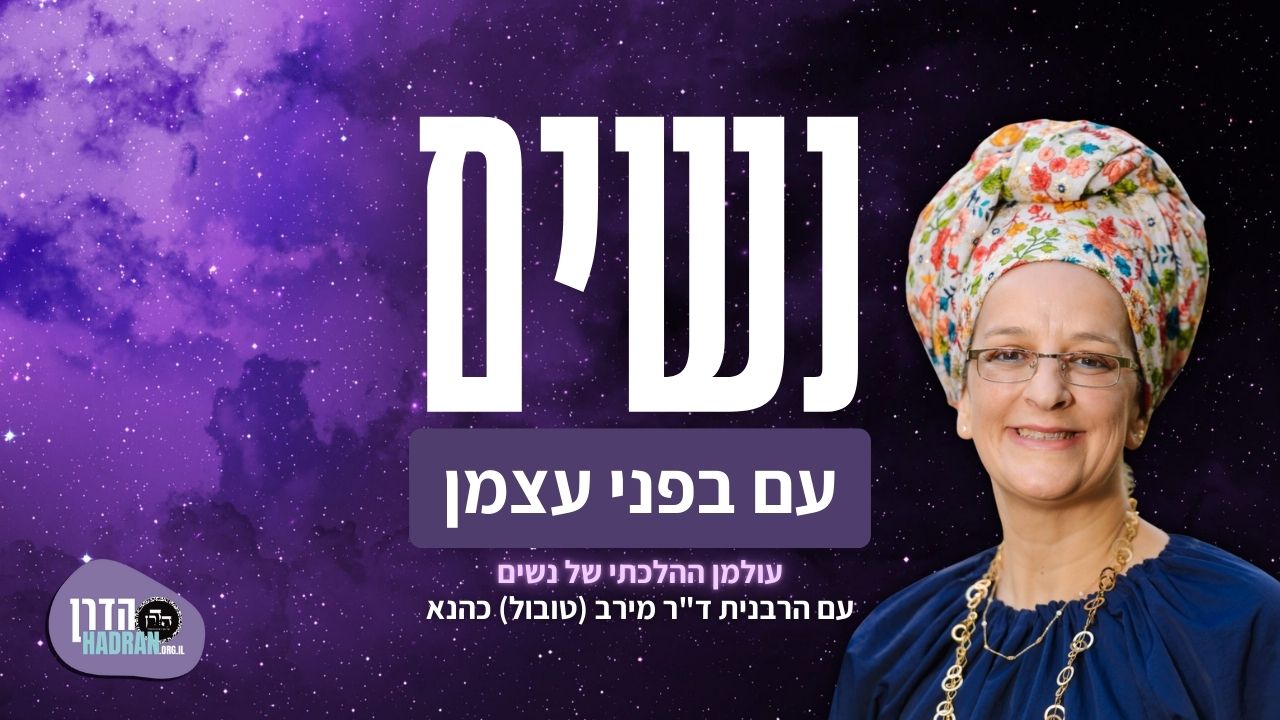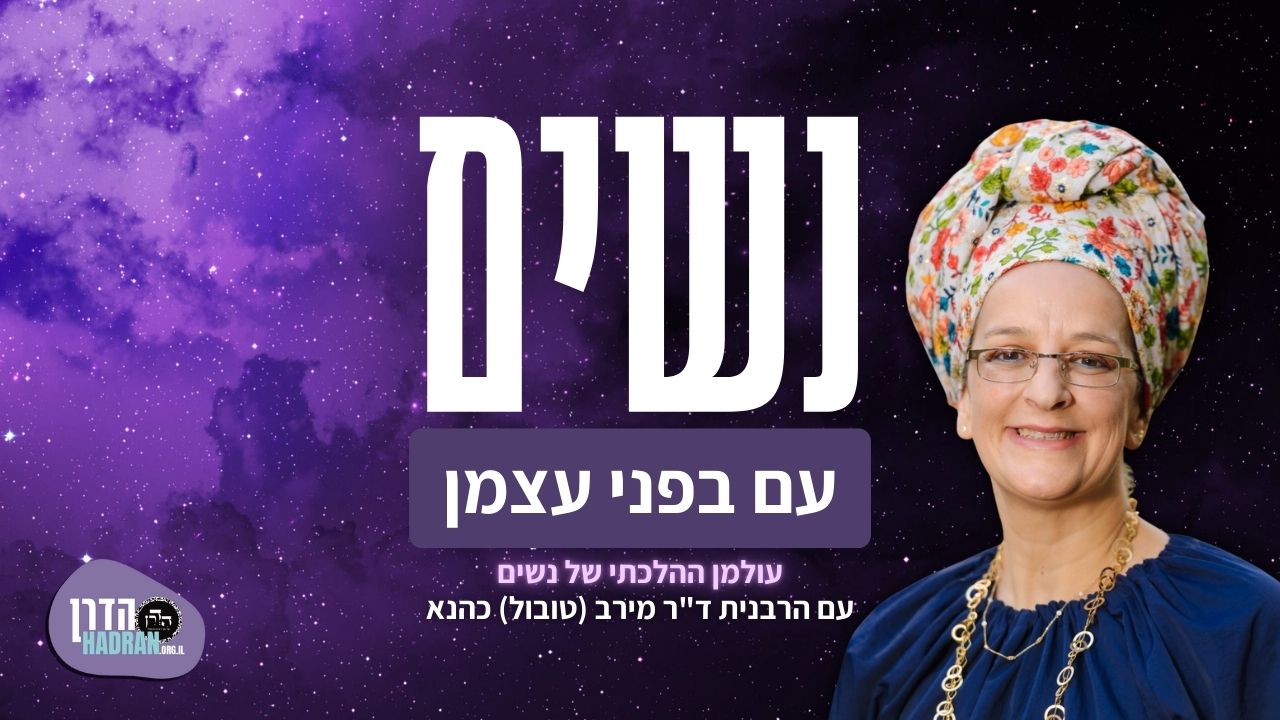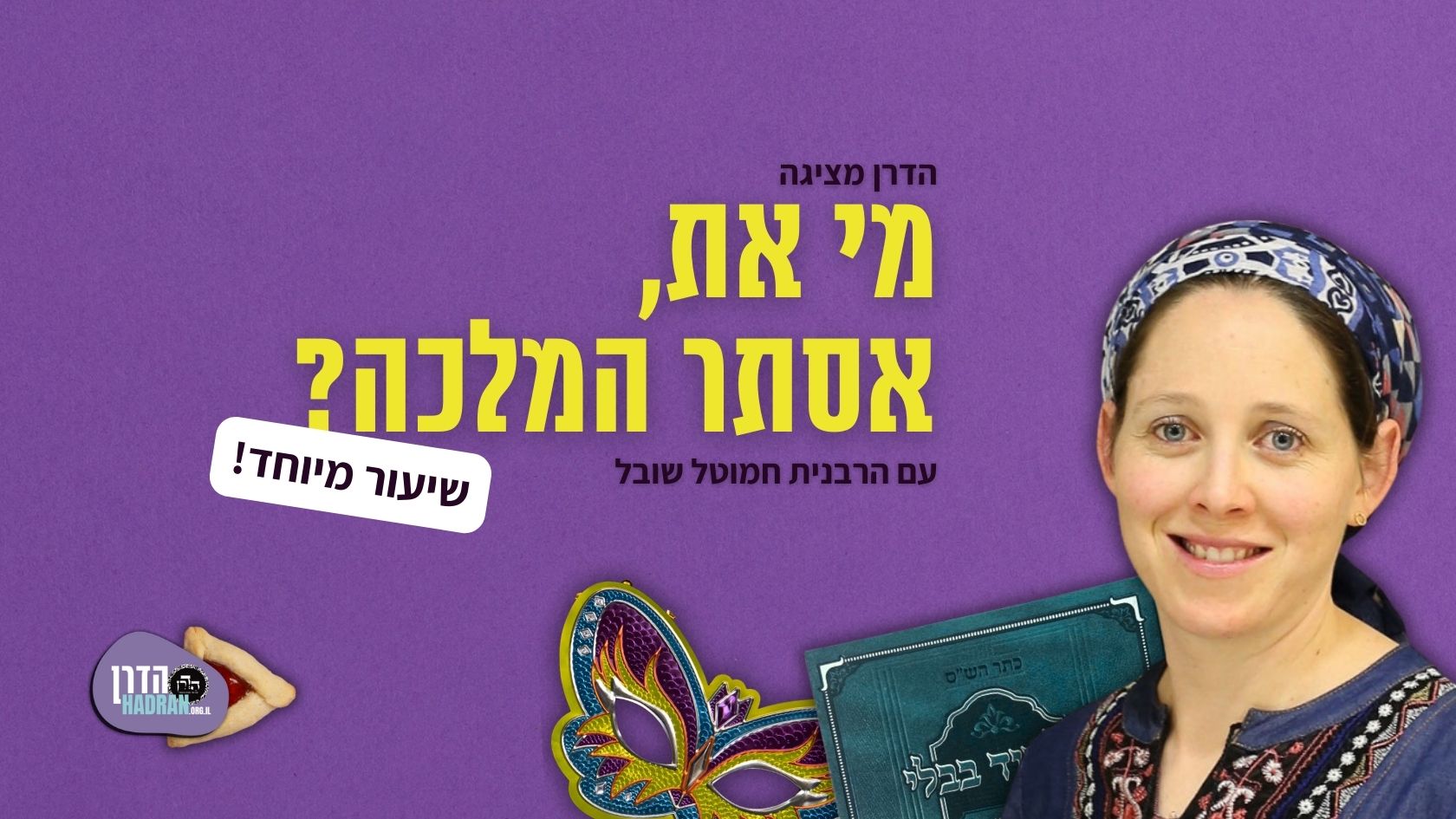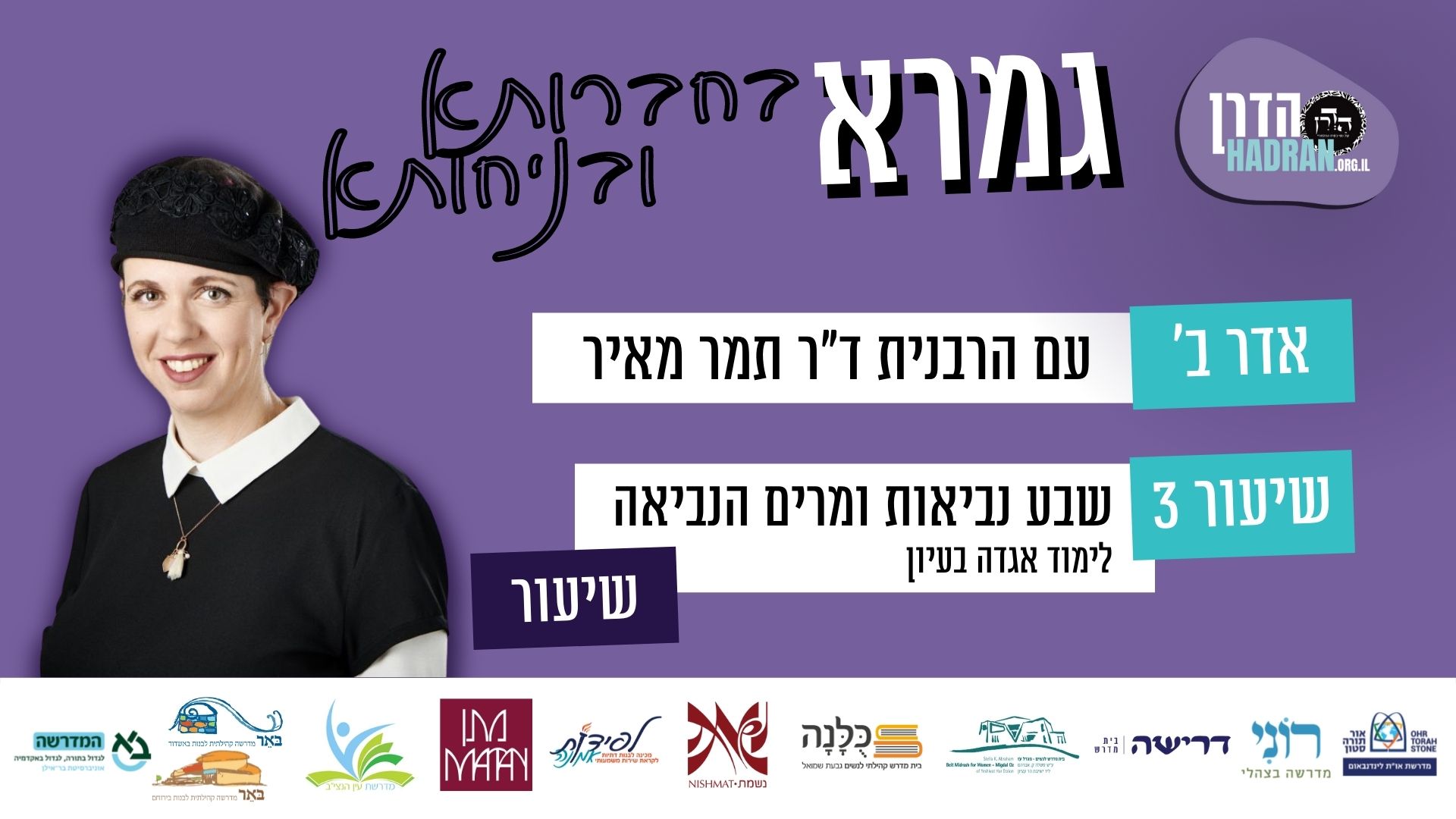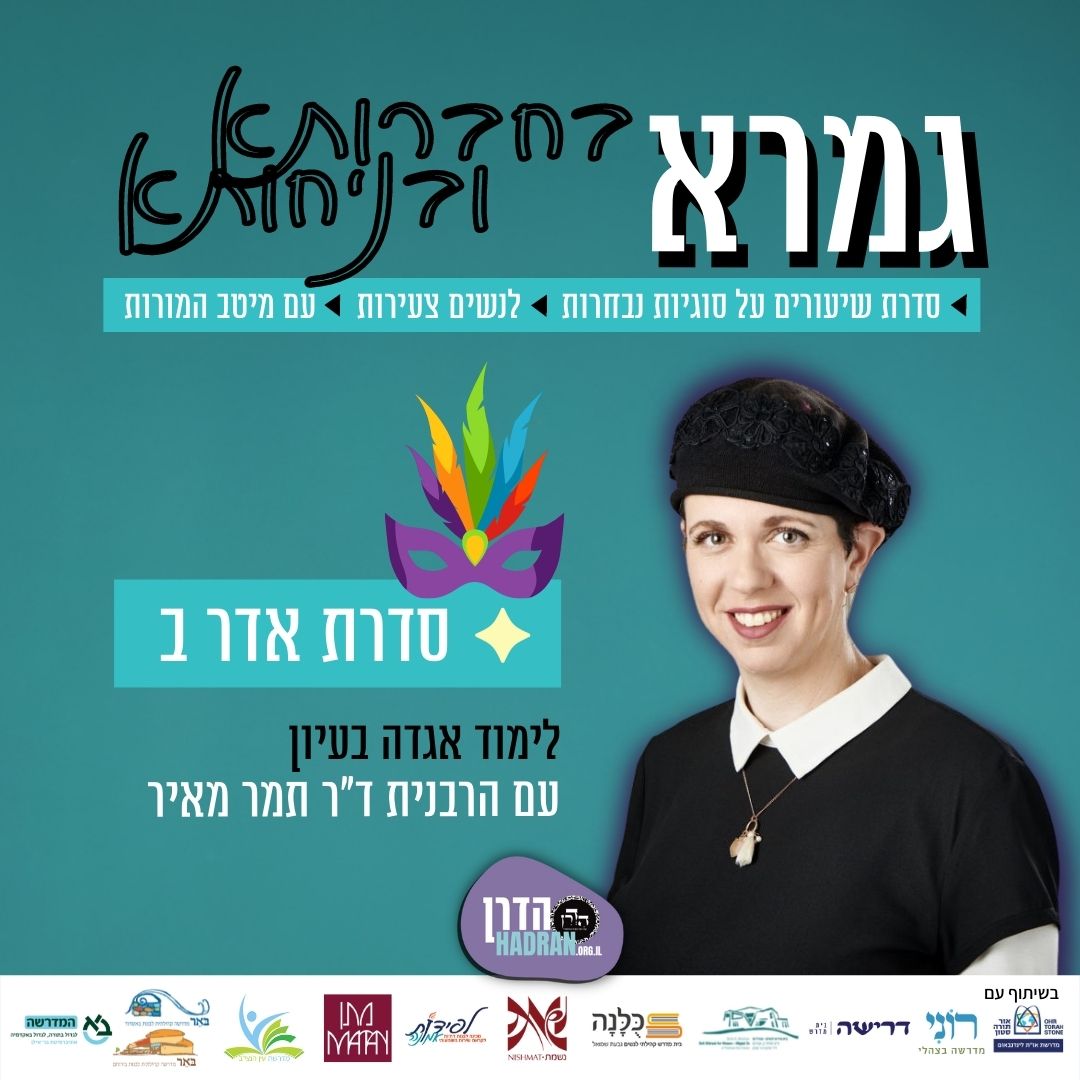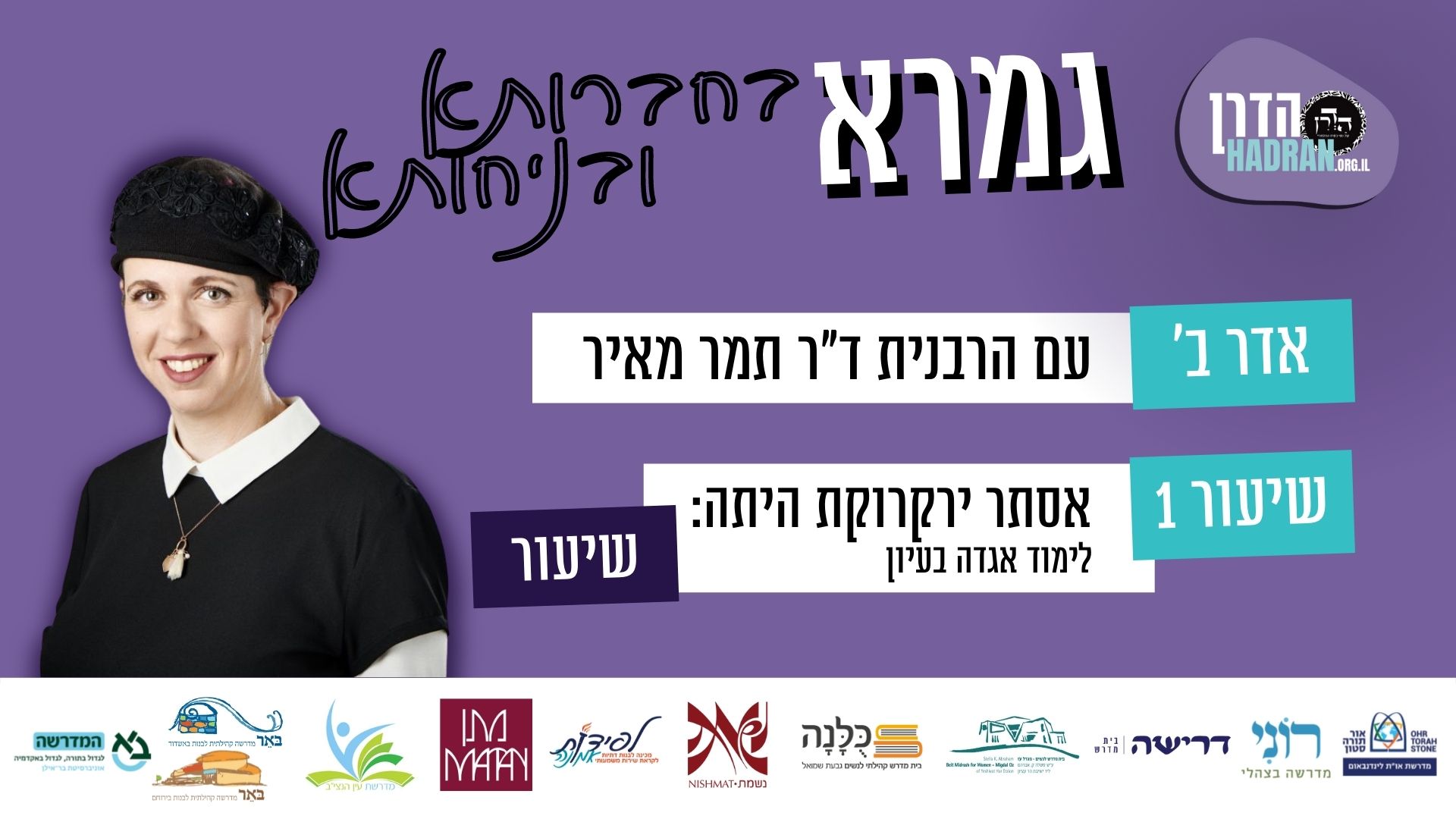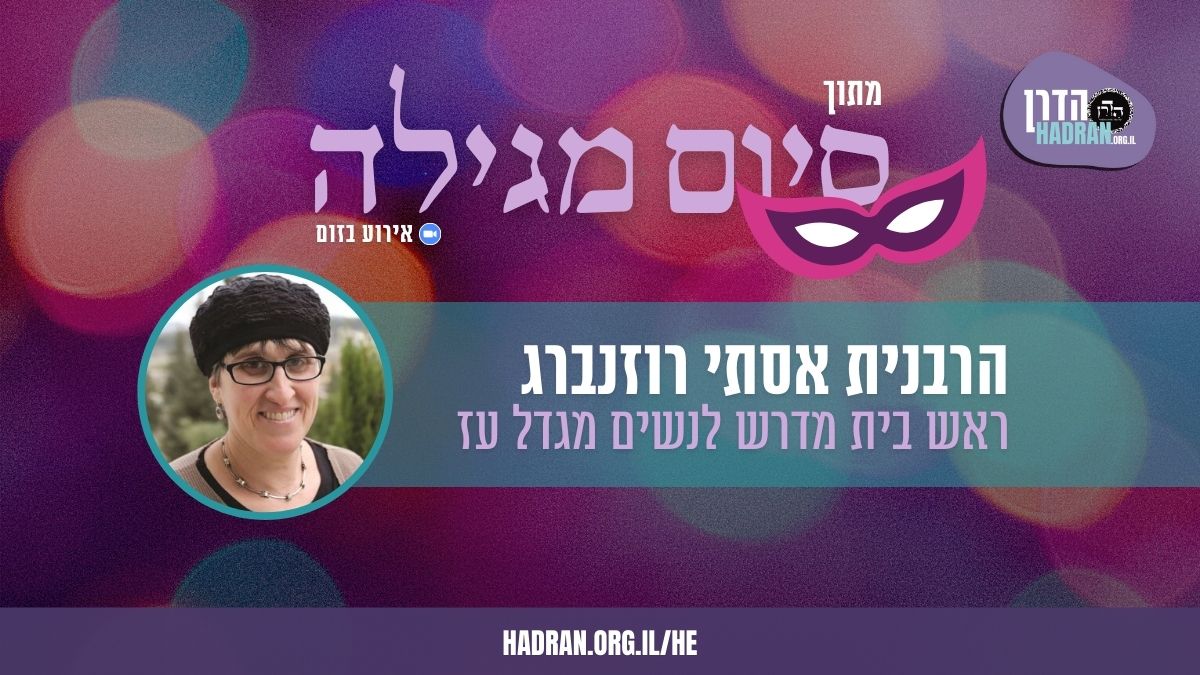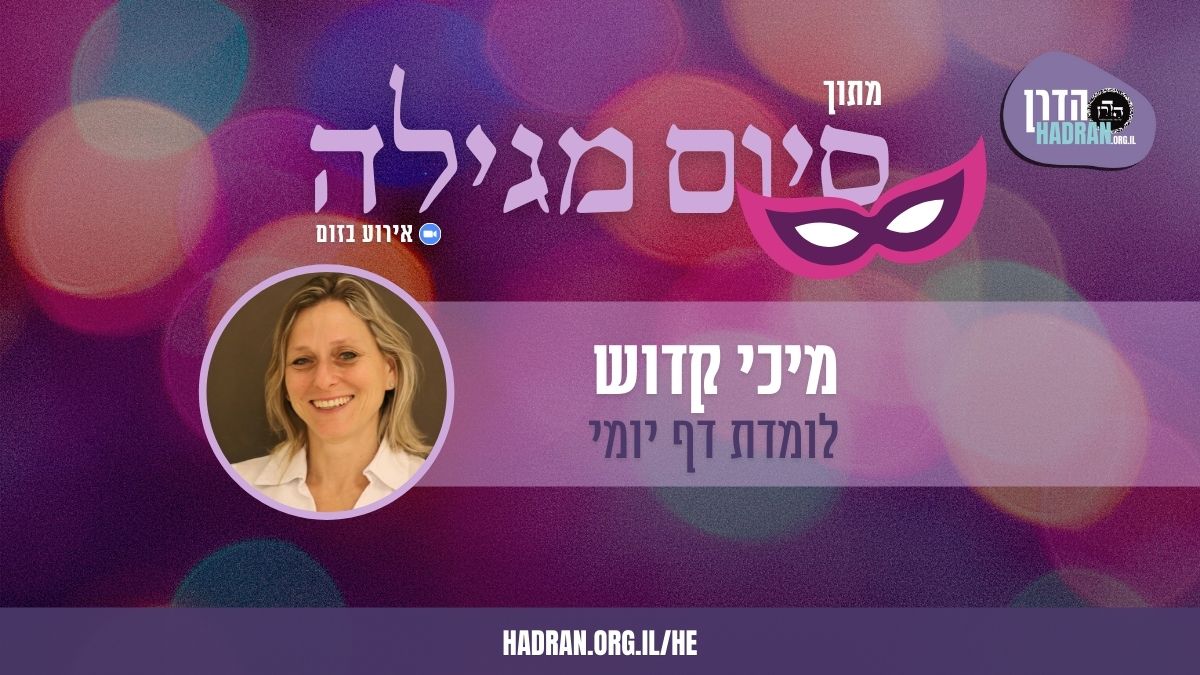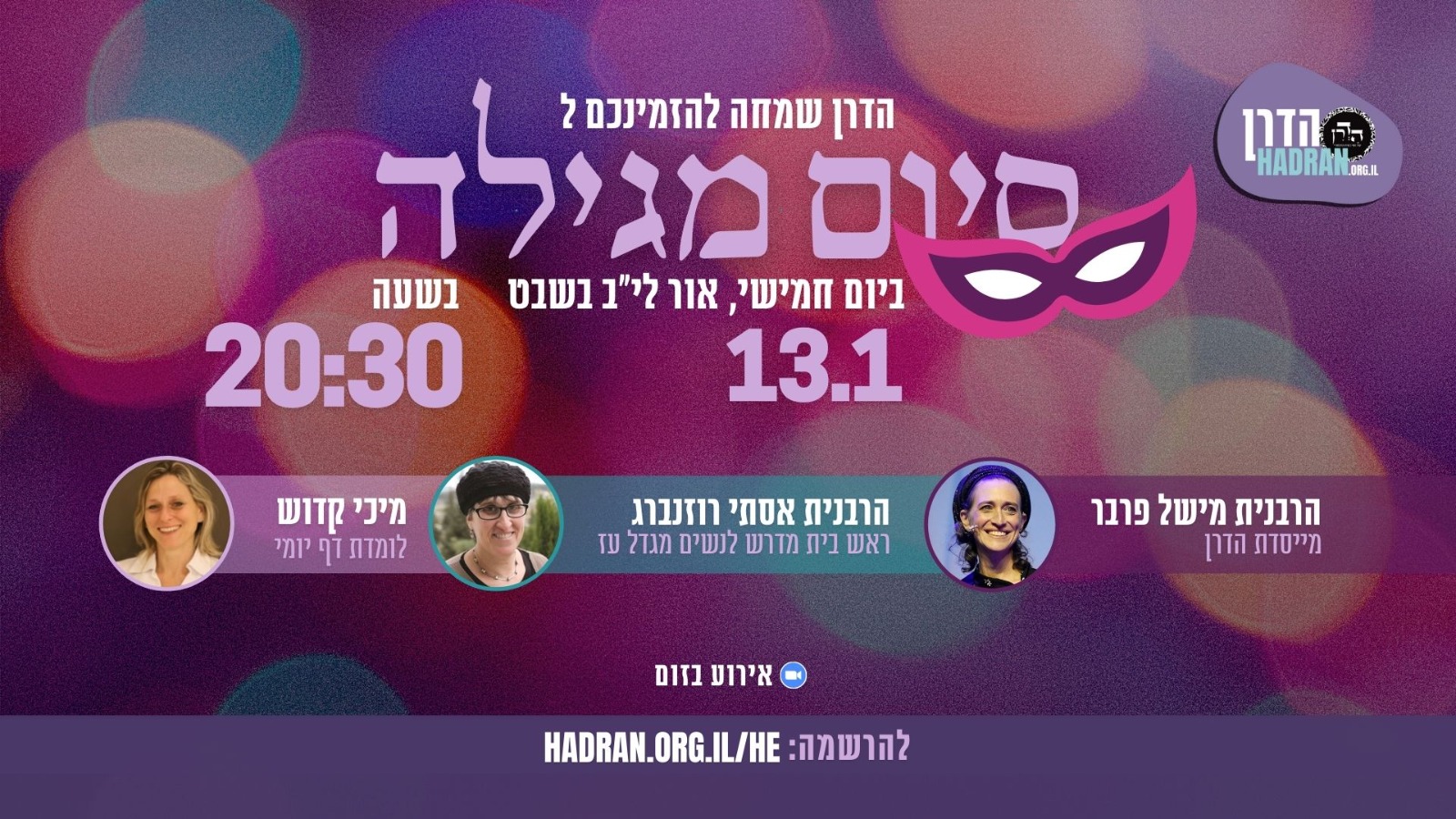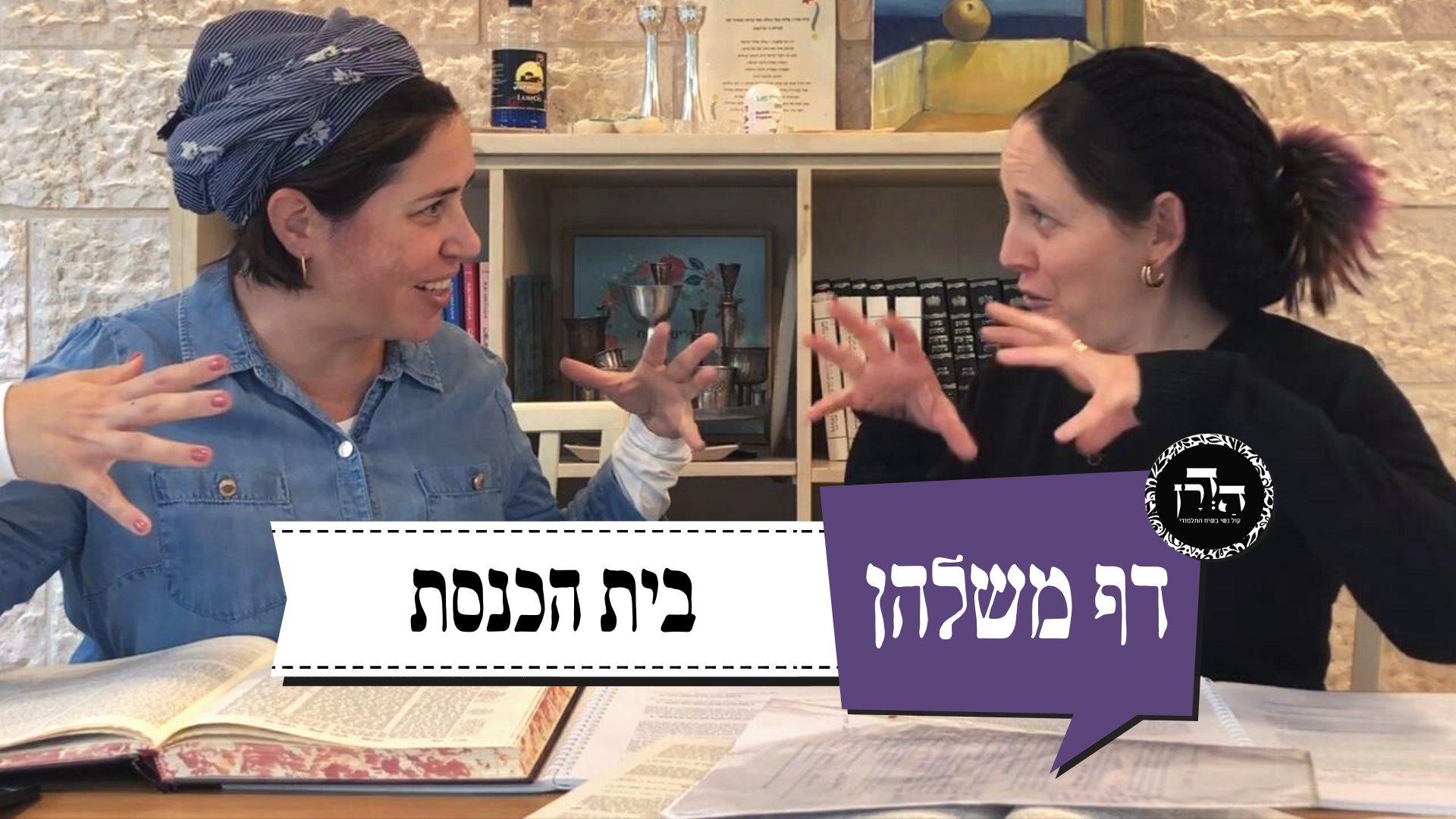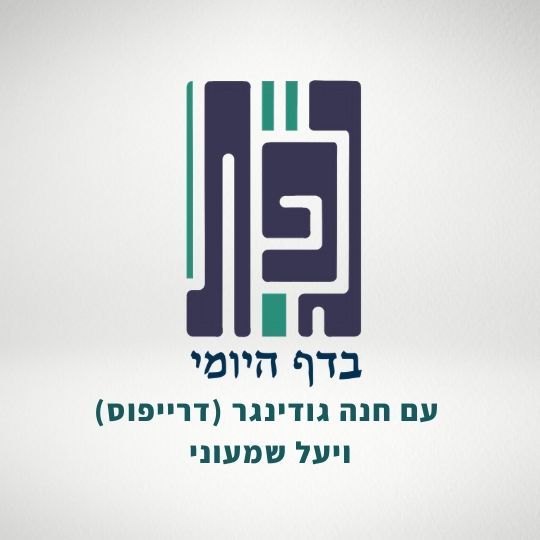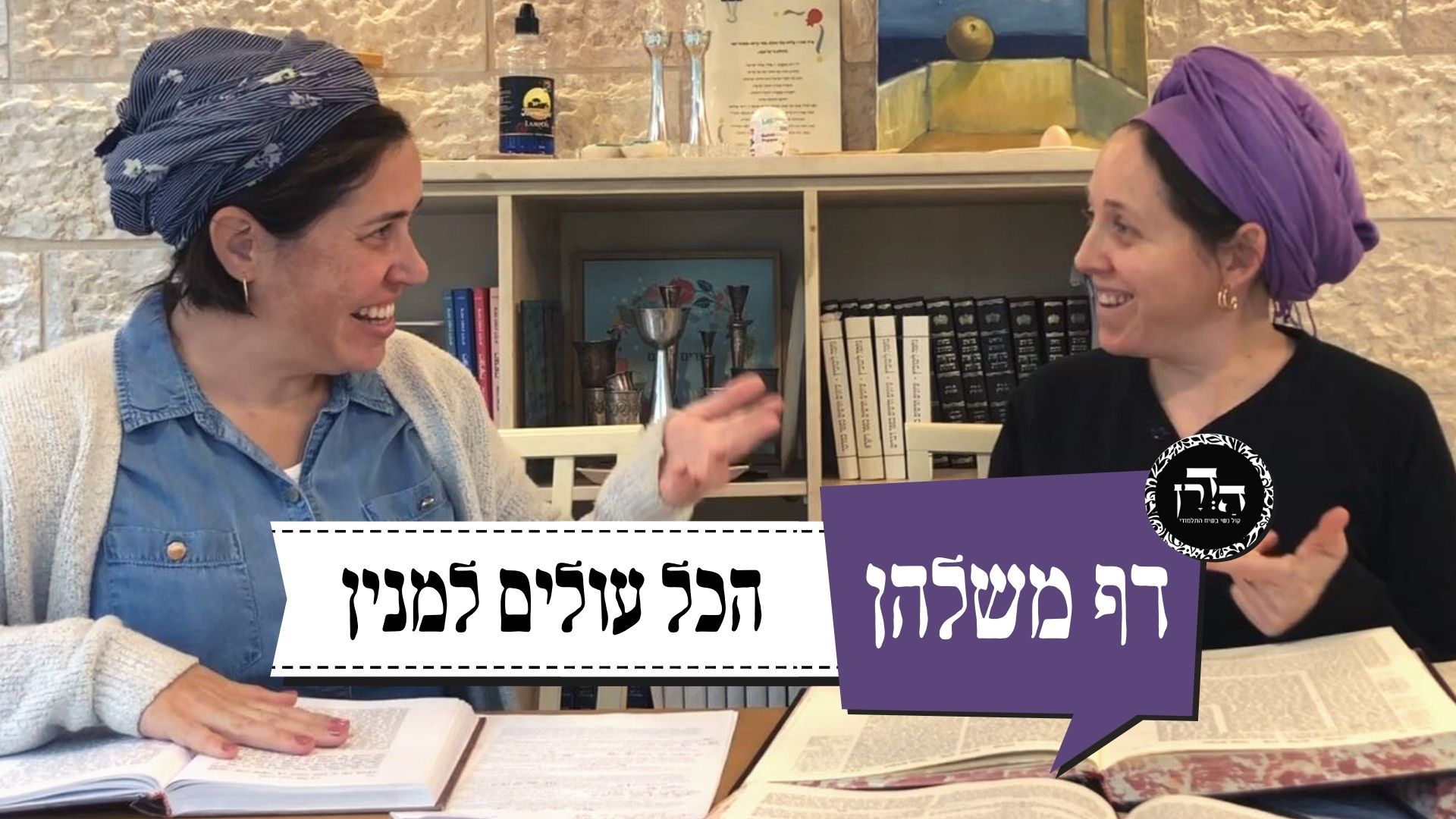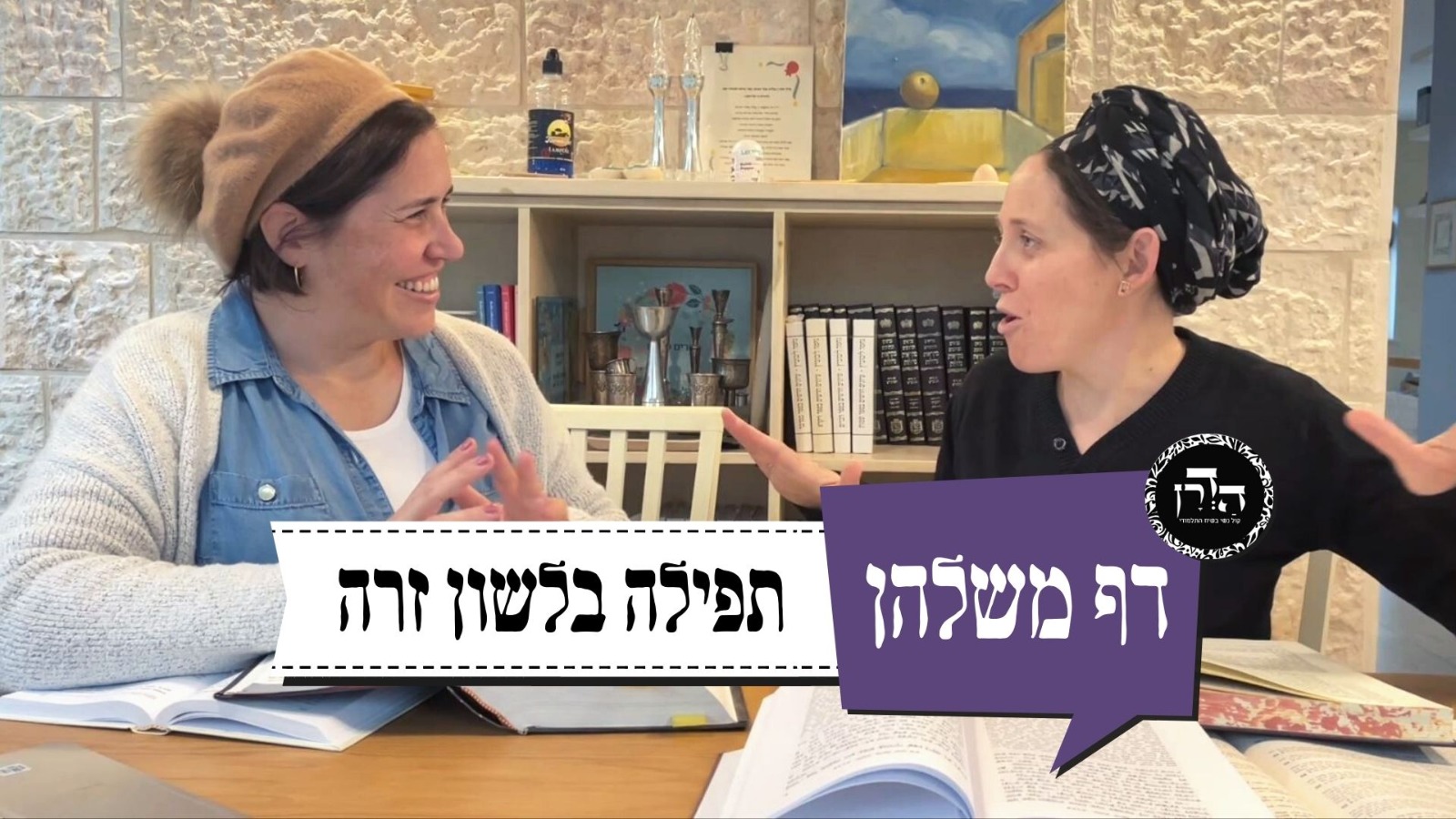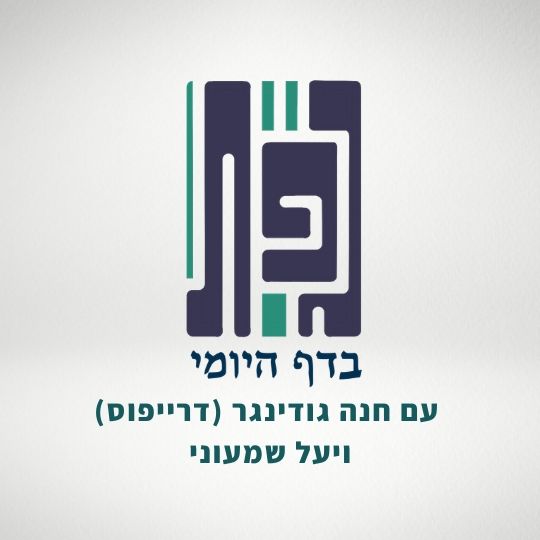האם יש צורך לעשרה אנשים כשקוראים את המגילה? האם זה משנה אם זה קוראים בזמנה או לא? מה נחשב לעיר גדולה בלא מקדימה ליום הכניסה? בפורים רק מקדימים אבל בדברים אחרים כגון תשעה באב שחל בשבת, וחגיגה והקהל מאחרים. למה? האם יש איסור מלאכה בפורים? האם זה רק תלוי במנהג המקום? האם טבריה נחשב עיר המוקפת חומה מימות יהושע בן נון או לא?
רוצה להקדיש שיעור?
כלים
העמקה
רוצה להבין מה באמת קורה מתחת לפני השטח של הסוגיה?
שיעורים, פודקאסטים והרחבות של מיטב המורות שלנו יפתחו לך עוד זוויות וכיווני חשיבה.
חדשה בלימוד הגמרא?
זה הדף הראשון שלך? איזו התרגשות עצומה! יש לנו בדיוק את התכנים והכלים שיעזרו לך לעשות את הצעדים הראשונים ללמידה בקצב וברמה שלך, כך תוכלי להרגיש בנוח גם בתוך הסוגיות המורכבות ומאתגרות.
פסיפס הלומדות שלנו
גלי את קהילת הלומדות שלנו, מגוון נשים, רקעים וסיפורים. כולן חלק מתנועה ומסע מרגש ועוצמתי.
מגילה ה
שִׂמְחָה, אֵינָהּ נוֹהֶגֶת אֶלָּא בִּזְמַנָּהּ.
the rejoicing that takes place on Purim is practiced only in its designated time, the fourteenth of Adar.
אָמַר רַב: מְגִילָּה בִּזְמַנָּהּ — קוֹרִין אוֹתָהּ אֲפִילּוּ בְּיָחִיד, שֶׁלֹּא בִּזְמַנָּהּ — בַּעֲשָׂרָה. רַב אַסִּי אָמַר: בֵּין בִּזְמַנָּהּ בֵּין שֶׁלֹּא בִּזְמַנָּהּ — בַּעֲשָׂרָה. הֲוָה עוֹבָדָא, וְחַשׁ לֵיהּ רַב לְהָא דְּרַב אַסִּי.
§ Rav said: One may read the Megilla in its proper time, i.e., on the fourteenth of Adar, even privately. However, when it is read not at its proper time, e.g., when the villages advance their reading to the day of assembly, it must be read with a quorum of ten, because the enactment allowing the Megilla to be read before its proper time was only made for a community. Rav Asi disagreed and said: Both at its proper time and not at its proper time, the Megilla must be read with a quorum of ten. The Gemara relates that there was an incident where Rav had to read the Megilla on Purim, and he was concerned for this opinion of Rav Asi and gathered ten men even though he was reading the Megilla in its proper time, on the fourteenth of Adar.
וּמִי אָמַר רַב הָכִי? וְהָאָמַר רַב יְהוּדָה בְּרֵיהּ דְּרַב שְׁמוּאֵל בַּר שִׁילַת מִשְּׁמֵיהּ דְּרַב: פּוּרִים שֶׁחָל לִהְיוֹת בְּשַׁבָּת — עֶרֶב שַׁבָּת זְמַנָּם. עֶרֶב שַׁבָּת זְמַנָּם?! וְהָא שַׁבָּת זְמַנָּם הוּא! אֶלָּא לָאו הָכִי קָאָמַר: שֶׁלֹּא בִּזְמַנָּם כִּזְמַנָּם. מָה זְמַנָּם — אֲפִילּוּ בְּיָחִיד, אַף שֶׁלֹּא בִּזְמַנָּם — אֲפִילּוּ בְּיָחִיד?
The Gemara asks: And did Rav actually say this, that when the Megilla is read not at its proper time, it can only be read with a quorum of ten? Didn’t Rav Yehuda, son of Rav Shmuel bar Sheilat, say in the name of Rav: If Purim occurs on Shabbat, Shabbat eve is the proper time for reading the Megilla? The Gemara expresses surprise with regard to the wording of Rav’s statement: Is Shabbat eve the proper time for reading the Megilla? Isn’t Shabbat itself its proper time? Rather, is it not true that this is what he said, i.e., that this is the way his statement should be understood: Reading the Megilla not at its proper time is like reading it at its proper time; just as at its proper time, it can be read even privately, so too, not at its proper time, it can be read even privately.
לָא, לְעִנְיַן מִקְרָא מְגִילָּה בַּעֲשָׂרָה. אֶלָּא מַאי ״עֶרֶב שַׁבָּת זְמַנָּם״ — לְאַפּוֹקֵי מִדְּרַבִּי, דְּאָמַר: הוֹאִיל וְנִדְחוּ עֲיָירוֹת מִמְּקוֹמָן — יִדָּחוּ לְיוֹם הַכְּנִיסָה, הָא קָא מַשְׁמַע לַן דְּעֶרֶב שַׁבָּת זְמַנָּם הוּא.
The Gemara rejects this argument: Rav’s statement was not made with regard to reading the Megilla with a quorum of ten. Rather, what is the meaning of Rav’s statement that Shabbat eve is the proper time? It was meant to exclude the opinion of Rabbi Yehuda HaNasi, who said: Since the readings in the large towns were already deferred from their usual date and the Megilla was not read on the fourteenth, they are deferred to the day of assembly. This statement of Rav teaches us that Shabbat eve is the proper time for these towns to read the Megilla, as stated in the mishna.
מַתְנִי׳ אִי זוֹ הִיא עִיר גְּדוֹלָה — כֹּל שֶׁיֵּשׁ בָּהּ עֲשָׂרָה בַּטְלָנִין. פָּחוֹת מִכָּאן — הֲרֵי זֶה כְּפָר.
MISHNA: What is considered a large city, where the Megilla is read on the fourteenth of Adar? Any city in which there are ten idlers. However, if there are fewer than that, it is considered a village, even if it has many inhabitants.
בְּאֵלּוּ אָמְרוּ מַקְדִּימִין וְלֹא מְאַחֲרִין. אֲבָל זְמַן עֲצֵי כֹּהֲנִים, וְתִשְׁעָה בְּאָב, חֲגִיגָה, וְהַקְהֵל — מְאַחֲרִין וְלֹא מַקְדִּימִין.
It was with regard to these times for reading the Megilla that the Sages said that one advances the reading of the Megilla before the fourteenth of Adar and one does not postpone the reading to after its proper time. However, with regard to the time when families of priests donate wood for the fire on the altar, which were times those families would treat as Festivals; as well as the fast of the Ninth of Av; the Festival peace-offering that was brought on the Festivals; and the commandment of assembly [hakhel] of the entire Jewish people in the Temple courtyard on Sukkot in the year following the Sabbatical year to hear the king read the book of Deuteronomy; one postpones their observance until after Shabbat and does not advance their observance to before Shabbat.
אַף עַל פִּי שֶׁאָמְרוּ מַקְדִּימִין וְלֹא מְאַחֲרִין — מוּתָּרִין בְּהֶסְפֵּד וּבְתַעֲנִית, וּמַתָּנוֹת לָאֶבְיוֹנִים. אָמַר רַבִּי יְהוּדָה: אֵימָתַי? מְקוֹם שֶׁנִּכְנָסִין בְּשֵׁנִי וּבַחֲמִישִׁי. אֲבָל מְקוֹם שֶׁאֵין נִכְנָסִין לֹא בַּשֵּׁנִי וְלֹא בַּחֲמִישִׁי — אֵין קוֹרִין אוֹתָהּ אֶלָּא בִּזְמַנָּהּ.
The mishna continues: Even though the Sages said that one advances the time for reading the Megilla and one does not postpone the reading, one is permitted to eulogize and fast on these days, as they are not actually Purim; nevertheless, gifts for the poor are distributed on this day. Rabbi Yehuda said: When is the Megilla read on the day of assembly, before the fourteenth of Adar? In a place where the villagers generally enter town on Monday and Thursday. However, in a place where they do not generally enter town on Monday and Thursday, one may read the Megilla only in its designated time, the fourteenth of Adar.
גְּמָ׳ תָּנָא: עֲשָׂרָה בַּטְלָנִין שֶׁבְּבֵית הַכְּנֶסֶת.
GEMARA: We learned in the mishna that a large city is one that has ten idlers. It was taught in a baraita: The ten idlers that are mentioned here are ten idlers that are in the synagogue, i.e., men who do not have professional responsibilities other than to sit in the synagogue and attend to communal religious needs. The presence of ten such men establishes a location as a prominent city.
בְּאֵלּוּ, אָמְרוּ מַקְדִּימִין וְלֹא מְאַחֲרִין. מַאי טַעְמָא? אָמַר רַבִּי אַבָּא אָמַר שְׁמוּאֵל: אָמַר קְרָא ״וְלֹא יַעֲבוֹר״.
We learned in the mishna: It was with regard to these times for reading the Megilla that the Sages said that one advances the reading of the Megilla and one does not postpone it. The Gemara asks: What is the reason for this? Rabbi Abba said that Shmuel said: The verse states: “The Jews ordained, and took upon them, and upon their seed, and upon all who joined themselves to them, and it shall not pass, that they should keep these two days” (Esther 9:27), which indicates that the designated time must not pass without the reading of the Megilla.
וְאָמַר רַבִּי אַבָּא אָמַר שְׁמוּאֵל: מִנַּיִן שֶׁאֵין מוֹנִין יָמִים לַשָּׁנִים — שֶׁנֶּאֱמַר: ״לְחׇדְשֵׁי הַשָּׁנָה״ — חֳדָשִׁים אַתָּה מוֹנֶה לַשָּׁנִים, וְאִי אַתָּה מוֹנֶה יָמִים לַשָּׁנִים.
Having mentioned a teaching of Rabbi Abba in the name of Shmuel, the Gemara cites another of his statements: And Rabbi Abba said that Shmuel said: From where is it derived that one does not count days to make up years, i.e., a year is considered to be comprised of either twelve or thirteen lunar months, and not 365 days? As it is stated: “Of the months of the year” (Exodus 12:2), which indicates that you count months to make up years, but you do not count days to make up years.
וְרַבָּנַן דְּקֵיסָרִי מִשּׁוּם רַבִּי אַבָּא אָמְרוּ: מִנַּיִן שֶׁאֵין מְחַשְּׁבִין שָׁעוֹת לֶחֳדָשִׁים, שֶׁנֶּאֱמַר: ״עַד חֹדֶשׁ יָמִים״. יָמִים אַתָּה מְחַשֵּׁב לֶחֳדָשִׁים, וְאִי אַתָּה מְחַשֵּׁב שָׁעוֹת לֶחֳדָשִׁים.
The Gemara adds: And the Sages of Caesarea said in the name of Rabbi Abba: From where is it derived that one does not calculate hours to reckon the months? A lunar cycle takes approximately twenty-nine and a half days, but a calendar month is considered to be twenty-nine or thirty full days and not precisely a lunar cycle. As it is stated: “Until a month of days” (Numbers 11:20), which indicates that you calculate days to reckon the months, but you do not calculate hours to reckon the months.
אֲבָל זְמַן עֲצֵי כֹהֲנִים וְתִשְׁעָה בְּאָב וַחֲגִיגָה וְהַקְהֵל — מְאַחֲרִין וְלֹא מַקְדִּימִין. תִּשְׁעָה בְּאָב — אַקְדּוֹמֵי פּוּרְעָנוּת לָא מַקְדְּמִי. חֲגִיגָה וְהַקְהֵל — מִשּׁוּם דְּאַכַּתִּי לָא מְטָא זְמַן חִיּוּבַיְיהוּ.
§ We learned in the mishna: However, with regard to the time when families of priests donate wood for the fire on the altar, the fast of the Ninth of Av, the Festival peace-offering, and the commandment of assembly [hakhel], one postpones their observance until after Shabbat and does not advance their observance to before Shabbat. The Gemara explains the reason for this halakha with respect to each item mentioned in the mishna. The fast of the Ninth of Av is not advanced because one does not advance calamity; since the Ninth of Av is a tragic time, its observance is postponed as long as possible. The Festival peace-offering and the commandment of assembly [hakhel] are not advanced because the time of their obligation has not yet arrived, and it is impossible to fulfill mitzvot before the designated time has arrived.
תָּנָא: חֲגִיגָה וְכׇל זְמַן חֲגִיגָה מְאַחֲרִין. בִּשְׁלָמָא חֲגִיגָה, דְּאִי מִיקְּלַע בְּשַׁבְּתָא מְאַחֲרִינַן לַהּ לְבָתַר שַׁבְּתָא. אֶלָּא זְמַן חֲגִיגָה מַאי הִיא?
It was taught in a baraita: One postpones the Festival peace-offering and the entire time period of the Festival peace-offering. The Gemara attempts to clarify this statement: Granted that when the baraita says that the Festival peace-offering is postponed, it means that if a Festival occurs on Shabbat, when the Festival peace-offering cannot be sacrificed, one postpones it until after Shabbat and sacrifices the offering on the intermediate days of the Festival. However, what is the meaning of the phrase: The time period of the Festival peace-offering?
אָמַר רַב אוֹשַׁעְיָא, הָכִי קָאָמַר: חֲגִיגָה בְּשַׁבָּת, וְעוֹלַת רְאִיָּיה אֲפִילּוּ בְּיוֹם טוֹב, דִּזְמַן חֲגִיגָה — מְאַחֲרִין.
Rav Oshaya said: This is what the baraita is saying: One postpones the Festival peace-offering if the Festival occurs on Shabbat, and one postpones the burnt-offering of appearance even due to the Festival itself. Despite the fact that a Festival day is the time for sacrificing a Festival peace-offering, the burnt-offering of appearance may not be sacrificed until after the Festival day.
מַנִּי — בֵּית שַׁמַּאי הִיא, דִּתְנַן, [בֵּית שַׁמַּאי אוֹמְרִים]: מְבִיאִין שְׁלָמִים בְּיוֹם טוֹב, וְאֵין סוֹמְכִין עֲלֵיהֶן,
The Gemara adds: Whose opinion is reflected in the mishna according to Rav Oshaya’s explanation? It is the opinion of Beit Shammai, as we learned in a mishna (Beitza 19a) that Beit Shammai say: One may bring peace-offerings on a Festival day to be sacrificed in the Temple. Most portions of a peace-offering are eaten by the priests and the individual who brought the offering. Consequently, its slaughter is considered food preparation, which is permitted on a Festival day. And one may not place his hands on the head of the offering, as that includes leaning with all one’s might upon the animal, which is prohibited on a Festival.
אֲבָל לֹא עוֹלוֹת. וּבֵית הִלֵּל אוֹמְרִים: מְבִיאִין שְׁלָמִים וְעוֹלוֹת וְסוֹמְכִין עֲלֵיהֶן.
However, burnt-offerings may not be brought at all on the Festival. Since they are not eaten, their slaughter is not considered food preparation, and it therefore constitutes a prohibited labor on the Festival. Beit Hillel disagree and say: One may bring both peace-offerings and burnt-offerings on a Festival day, and one may even place his hands on them.
רָבָא אָמַר: חֲגִיגָה, כׇּל זְמַן חֲגִיגָה — מְאַחֲרִין, טְפֵי — לָא. דִּתְנַן: מִי שֶׁלֹּא חָג בְּיוֹם טוֹב הָרִאשׁוֹן שֶׁל חַג — חוֹגֵג וְהוֹלֵךְ אֶת כָּל הָרֶגֶל כּוּלּוֹ, וְיוֹם טוֹב הָאַחֲרוֹן שֶׁל חַג. עָבַר הָרֶגֶל וְלֹא חָג — אֵינוֹ חַיָּיב בְּאַחְרָיוּתוֹ.
Rava said that the baraita should be understood as follows: One postpones the Festival peace-offering for the entire time period of the Festival peace-offering, i.e., for the entire duration of the Festival. However, it may not be postponed for longer than this. As we learned in a mishna (Ḥagiga 9a): One who did not offer the Festival peace-offering on the first Festival day of the festival of Sukkot may offer the Festival peace-offering for the duration of the entire pilgrimage Festival, including the intermediate days and the last day of the Festival. If the pilgrimage Festival has passed and he did not yet bring the Festival peace-offering, he is not obligated to pay restitution for it. The obligation is no longer in force, and he therefore is not liable to bring another offering as compensation.
רַב אָשֵׁי אָמַר: חֲגִיגָה וְכׇל זְמַן חֲגִיגָה — מְאַחֲרִין, וַאֲפִילּוּ עֲצֶרֶת דְּחַד יוֹמָא — מְאַחֲרִין, דִּתְנַן: מוֹדִים שֶׁאִם חָל עֲצֶרֶת לִהְיוֹת בְּשַׁבָּת — שֶׁיּוֹם טְבוֹחַ אַחַר הַשַּׁבָּת.
Rav Ashi said that the baraita should be understood as follows: The Festival peace-offering may be postponed for the entire time period of a Festival peace-offering. This indicates that even if Shavuot, which is one day, occurs on Shabbat, one postpones the Festival peace-offering and offers it on one of the six days after Shavuot. As we learned in a mishna (Ḥagiga 17a): Beit Hillel concede that if Shavuot occurs on Shabbat, the day of slaughter is after Shabbat. Since the Festival peace-offering and the burnt-offering of appearance cannot be sacrificed on Shabbat, they are slaughtered after Shabbat. This indicates that the Festival peace-offering may be slaughtered after the Festival day of Shavuot, as is the case on the other Festivals.
אָמַר רַבִּי אֶלְעָזָר אָמַר רַבִּי חֲנִינָא: רַבִּי נָטַע נְטִיעָה בְּפוּרִים,
Rabbi Elazar said that Rabbi Ḥanina said: Rabbi Yehuda HaNasi did several unusual things: He planted a sapling on Purim, and was not concerned about performing labor and thereby possibly denigrating the day.
וְרָחַץ בִּקְרוֹנָהּ שֶׁל צִפּוֹרִי בְּשִׁבְעָה עָשָׂר בְּתַמּוּז, וּבִקֵּשׁ לַעֲקוֹר תִּשְׁעָה בְּאָב — וְלֹא הוֹדוּ לוֹ.
And he bathed at the time when the wagons [kerona] were traveling through Tzippori, i.e., on the market day, when the public would know about it, on the seventeenth of Tammuz, to show that bathing is permitted on that day. And he sought to abolish the fast of the Ninth of Av. And with respect to the Ninth of Av, the Sages did not agree with him.
אָמַר לְפָנָיו רַבִּי אַבָּא בַּר זַבְדָּא: רַבִּי, לֹא כָּךְ הָיָה מַעֲשֶׂה. אֶלָּא תִּשְׁעָה בְּאָב שֶׁחָל לִהְיוֹת בְּשַׁבָּת הֲוָה, וּדְחִינוּהוּ לְאַחַר הַשַּׁבָּת. וְאָמַר רַבִּי: הוֹאִיל וְנִדְחָה — יִדָּחֶה, וְלֹא הוֹדוּ חֲכָמִים. קָרֵי עֲלֵיהּ: ״טוֹבִים הַשְּׁנַיִם מִן הָאֶחָד״.
Rabbi Abba bar Zavda said to Rabbi Elazar: My teacher, the incident did not occur in this fashion. Rabbi Yehuda HaNasi never sought to abolish the fast of the Ninth of Av. Rather, it was a year when the Ninth of Av occurred on Shabbat, and they postponed it until after Shabbat. And Rabbi Yehuda HaNasi said about that case: Since it has already been deferred from its usual time, let it be altogether deferred this year. And the Rabbis did not agree with him. Rabbi Elazar read the verse about Rabbi Abba bar Zavda: “Two are better than one” (Ecclesiastes 4:9), meaning, it is good that you were here to provide an accurate report about that incident.
וְרַבִּי הֵיכִי נָטַע נְטִיעָה בְּפוּרִים? וְהָתָנֵי רַב יוֹסֵף: ״שִׂמְחָה וּמִשְׁתֶּה וְיוֹם טוֹב״, ״שִׂמְחָה״ — מְלַמֵּד שֶׁאֲסוּרִים בְּהֶסְפֵּד, ״מִשְׁתֶּה״ — מְלַמֵּד שֶׁאָסוּר בְּתַעֲנִית, ״וְיוֹם טוֹב״ — מְלַמֵּד שֶׁאָסוּר בַּעֲשִׂיַּית מְלָאכָה! אֶלָּא: רַבִּי, בַּר אַרְבֵּיסַר הֲוָה, וְכִי נְטַע — בַּחֲמֵיסַר נְטַע.
The Gemara asks: And how could Rabbi Yehuda HaNasi plant a sapling on Purim? Didn’t Rav Yosef teach with regard to the verse: “Therefore the Jews of the villages, who dwell in the unwalled towns, make the fourteenth day of the month of Adar a day of gladness and feasting, and a good day [yom tov]” (Esther 9:19), that the term “gladness” teaches that it is prohibited to eulogize on Purim; “feasting” teaches that it is prohibited to fast; and the term “good day” [yom tov] teaches that it is prohibited to perform labor, just as on a Festival, which is also referred to as a yom tov? Rather, what happened was as follows: Rabbi Yehuda HaNasi was in a place that observed Purim on the fourteenth, and when he planted the sapling, he planted it on the fifteenth.
אִינִי? וְהָא רַבִּי בִּטְבֶרְיָא הֲוָה, וּטְבֶרְיָא מוּקֶּפֶת חוֹמָה מִימוֹת יְהוֹשֻׁעַ בִּן נוּן הֲוַאי! אֶלָּא, רַבִּי בַּר חֲמֵיסָר הֲוָה, וְכִי נְטַע — בְּאַרְבֵּיסַר הֲוָה.
The Gemara asks: Is that so? Wasn’t Rabbi Yehuda HaNasi in Tiberias, and Tiberias was surrounded by a wall since the days of Joshua, son of Nun. Consequently, he was obligated to observe Purim on the fifteenth. Rather, say just the opposite: Rabbi Yehuda HaNasi lived in a place that observed Purim on the fifteenth, and when he planted the sapling, he planted it on the fourteenth.
וּמִי פְּשִׁיטָא לֵיהּ דִּטְבֶרְיָא מוּקֶּפֶת חוֹמָה מִימוֹת יְהוֹשֻׁעַ בִּן נוּן? וְהָא חִזְקִיָּה קָרֵי בִּטְבֶרְיָא בְּאַרְבֵּיסַר וּבַחֲמֵיסַר? מְסַפְּקָא לֵיהּ אִי מוּקֶּפֶת חוֹמָה מִימוֹת יְהוֹשֻׁעַ בִּן נוּן הִיא אִי לָא. לְחִזְקִיָּה מְסַפְּקָא לֵיהּ, לְרַבִּי פְּשִׁיטָא לֵיהּ.
The Gemara asks: Was it obvious to Rabbi Yehuda HaNasi that the city of Tiberias was surrounded by a wall since the days of Joshua, son of Nun? Didn’t Hezekiah read the Megilla in Tiberias both on the fourteenth and on the fifteenth of Adar, because he was uncertain if it had been surrounded by a wall since the days of Joshua, son of Nun, or not? The Gemara answers: Hezekiah was indeed uncertain about the matter, whereas it was obvious to Rabbi Yehuda HaNasi that Tiberias had been surrounded by a wall in the time of Joshua.
וְכִי פְּשִׁיטָא לֵיהּ, מִי שְׁרֵי? וְהָכְתִיב בִּמְגִילַּת תַּעֲנִית: אֵת יוֹם אַרְבָּעָה עָשָׂר וְאֵת יוֹם חֲמִשָּׁה עָשָׂר יוֹמֵי פּוּרַיָּא אִינּוּן, דְּלָא לְמִסְפַּד בְּהוֹן,
The Gemara asks further: And when it was obvious to Rabbi Yehuda HaNasi that the Megilla should be read in Tiberias on the fifteenth, was it permitted to plant there on the fourteenth? Isn’t it written in Megillat Ta’anit that the fourteenth day and the fifteenth day of Adar are the days of Purim, and one is not permitted to eulogize on them?
וְאָמַר רָבָא: לֹא נִצְרְכָא, אֶלָּא לֶאֱסוֹר אֶת שֶׁל זֶה בָּזֶה וְאֶת שֶׁל זֶה בָּזֶה? הָנֵי מִילֵּי בְּהֶסְפֵּד וּבְתַעֲנִית, אֲבָל מְלָאכָה — יוֹם אֶחָד וְתוּ לָא.
And Rava said: This statement is necessary only to prohibit those who observe Purim on this day to eulogize on that day, and those who observe Purim on that day to eulogize on this day. Since the two days are mentioned in the Bible, it was only necessary to mention them in Megillat Ta’anit in order to indicate that the prohibition against eulogizing applies to both days. Presumably, the same should apply to the prohibition against performing labor. Consequently, how could Rabbi Yehuda HaNasi plant a sapling on the fourteenth of Adar? The Gemara answers: That applies only to eulogies and fasting. However, labor is prohibited for only one day, either the fourteenth or the fifteenth, and no more.
אִינִי? וְהָא רַב חַזְיֵיהּ לְהָהוּא גַּבְרָא דַּהֲוָה קָא שָׁדֵי כִּיתָּנָא בְּפוּרַיָּא, וְלַטְיֵיהּ וְלָא צְמַח כִּיתָּנֵיהּ! הָתָם, בַּר יוֹמָא הֲוָה.
The Gemara asks: Is that so? Didn’t Rav see a certain man planting flax on Purim, and cursed him, and the man’s flax never grew. The Gemara answers: There, the man was obligated to observe Purim on that day that he planted the flax. Therefore, it was certainly prohibited to perform labor.
רַבָּה בְּרֵיהּ דְּרָבָא אָמַר: אֲפִילּוּ תֵּימָא בְּיוֹמֵיהּ — הֶסְפֵּד וְתַעֲנִית קַבִּילוּ עֲלַיְיהוּ, מְלָאכָה לָא קַבִּילוּ עֲלַיְיהוּ.
Rabba, son of Rava, said a different answer to the question: Even if you say that Rabbi Yehuda HaNasi planted the sapling on his own day of Purim, i.e., on the day that the Megilla was read in his location, it was still permitted to plant the sapling. This is because the Jewish people accepted upon themselves the prohibitions against eulogizing and fasting on Purim, but they did not accept upon themselves the prohibition against performing labor.
דְּמֵעִיקָּרָא כְּתִיב: ״שִׂמְחָה וּמִשְׁתֶּה וְיוֹם טוֹב״, וּלְבַסּוֹף כְּתִיב: ״לַעֲשׂוֹת אוֹתָם יְמֵי מִשְׁתֶּה וְשִׂמְחָה״, וְאִילּוּ ״יוֹם טוֹב״ לָא כְּתִיב.
This can be proven from the fact that initially, when Mordecai and Esther proposed the celebration of Purim, it is written: “A day of gladness and feasting and a good day [yom tov]” (Esther 9:19), and at the end, when the celebration of Purim was accepted by the Jewish people, it is written: “That they should make them days of feasting and gladness” (Esther 9:22), whereas the term good day [yom tov], which alludes to a day when it is prohibited to perform labor, is not written. The people never accepted upon themselves the prohibition against performing labor on Purim as if it were a Festival, and therefore the prohibition never took effect.
וְאֶלָּא רַב מַאי טַעְמָא לַטְיֵיהּ לְהָהוּא גַּבְרָא? דְּבָרִים הַמּוּתָּרִין וַאֲחֵרִים נָהֲגוּ בָּהֶן אִיסּוּר הֲוָה. וּבְאַתְרֵיהּ דְּרַבִּי לָא נְהוּג.
The Gemara asks: If labor is permitted on Purim, what is the reason that Rav cursed that man who planted the flax? The Gemara answers: It was a case of matters that are permitted by halakha, but others were accustomed to treat them as a prohibition, in which case one may not permit these actions in their presence, lest they come to treat other prohibitions lightly. In the place where that man planted his flax, it was customary to abstain from labor on Purim. However, in Rabbi Yehuda HaNasi’s place, it was not the custom to abstain from labor on Purim, and therefore it was permitted for him to plant the sapling even in public.
וְאִיבָּעֵית אֵימָא: לְעוֹלָם נְהוּג — וְרַבִּי נְטִיעָה שֶׁל שִׂמְחָה נָטַע. כְּדִתְנַן: עָבְרוּ אֵלּוּ וְלֹא נַעֲנוּ — מְמַעֲטִין בְּמַשָּׂא וּמַתָּן, בְּבִנְיָן וּבִנְטִיעָה, בְּאֵירוּסִין וּבְנִישּׂוּאִין.
And if you wish, say an alternative answer: Actually, it was the custom to abstain from labor on Purim in Rabbi Yehuda HaNasi’s place, and Rabbi Yehuda HaNasi engaged in a joyful act of planting, for pleasure rather than for financial benefit. As we learned in a mishna with regard to public fasts: If these fasts for rain have passed and the community’s prayers have still not been answered, and the drought continues, one decreases his business activities, as well as construction, planting, betrothals, and marriages.
וְתָנָא עֲלַהּ: בִּנְיָן — בִּנְיָן שֶׁל שִׂמְחָה, נְטִיעָה — נְטִיעָה שֶׁל שִׂמְחָה. אֵיזֶהוּ בִּנְיָן שֶׁל שִׂמְחָה? זֶה הַבּוֹנֶה בֵּית חַתְנוּת לִבְנוֹ. אֵיזוֹ הִיא נְטִיעָה שֶׁל שִׂמְחָה? זֶה הַנּוֹטֵעַ אַבְוָרַנְקֵי שֶׁל מְלָכִים.
And it was taught in a baraita about this mishna: When the Sages said that construction must be decreased on public fasts, they were not referring to the construction of homes for people who have nowhere to live, but to joyful construction. Similarly, when they said that planting must be decreased, they were not referring to planting food crops, but to joyful planting. What is meant by joyful construction? This is referring to one who builds a wedding chamber for his son. It was customary to build a special house where the wedding would take place, and at times the couple would also live there. What is meant by joyful planting? This is referring to one who plants trees for shade and pleasure such as one might find in a royal garden [avurneki]. Rabbi Yehuda HaNasi engaged in joyful planting on Purim, in keeping with the joyous nature of the day.
גּוּפָא: חִזְקִיָּה קָרֵי בִּטְבֶרְיָא בְּאַרְבֵּיסַר וּבַחֲמֵיסַר, מְסַפְּקָא לֵיהּ אִי מוּקֶּפֶת חוֹמָה מִימוֹת יְהוֹשֻׁעַ בִּן נוּן הִיא אִי לָא. וּמִי מְסַפְּקָא לֵיהּ מִלְּתָא דִטְבֶרְיָא? וְהָכְתִיב: ״וְעָרֵי מִבְצָר הַצִּדִּים צֵר וְחַמַּת רַקַּת וְכִנָּרֶת״, וְקַיְימָא לַן רַקַּת זוֹ טְבֶרְיָא! הַיְינוּ טַעְמָא דִּמְסַפְּקָא לֵיהּ, מִשּׁוּם דְּחַד גִּיסָא שׁוּרָא דְיַמָּא הֲוָת.
§ The Gemara examines the matter itself cited in the previous discussion. Hezekiah read the Megilla in Tiberias both on the fourteenth and on the fifteenth of Adar, because he was uncertain if it had been surrounded by a wall since the days of Joshua, son of Nun, or not. The Gemara asks: Was he really uncertain about the matter of Tiberias? Isn’t it written: “And the fortified cities were Ziddim-zer, and Hammath, Rakkath, and Chinnereth” (Joshua 19:35), and we maintain that Rakkath is Tiberias? The Gemara answers: This is the reason that he was uncertain: Although Tiberias was surrounded by a wall in the time of Joshua, Hezekiah was uncertain about the halakha due to the fact that on one side, there was a wall of the sea, i.e., there was no physical wall, but the city was protected due to the fact that it adjoined the sea.
אִי הָכִי, אַמַּאי מְסַפְּקָא לֵיהּ? וַדַּאי לָאו חוֹמָה הִיא! דְּתַנְיָא: ״אֲשֶׁר לוֹ חוֹמָה״ — וְלֹא שׁוּר אִיגַּר. ״סָבִיב״ — פְּרָט לִטְבֶרְיָא שֶׁיַּמָּהּ חוֹמָתָהּ.
The Gemara asks: If so, why was he uncertain? The sea is certainly not a wall. As it is taught in a baraita with regard to the sale of houses in walled cities, the phrase: “Which has a wall” (Leviticus 25:30), indicates that the city has a bona fide wall and not merely a wall of roofs. If a city is completely encircled by attached houses but there is no separate wall, it is not considered a walled city. The next verse, which is referring to cities that have no wall “round about them” (Leviticus 25:31), excludes Tiberias from being considered a walled city, as the sea is its wall on one side and it is not fully encircled by a physical wall. Consequently, Tiberias is not considered a walled city.
לְעִנְיַן בָּתֵּי עָרֵי חוֹמָה לָא מְסַפְּקָא לֵיהּ. כִּי קָא מְסַפְּקָא לֵיהּ לְעִנְיַן מִקְרָא מְגִילָּה, מַאי פְּרָזִים וּמַאי מוּקָּפִין דִּכְתִיבִי גַּבֵּי מִקְרָא מְגִילָּה? מִשּׁוּם דְּהָנֵי מִיגַּלּוּ וְהָנֵי לָא מִיגַּלּוּ — וְהָא נָמֵי מִיגַּלְּיָא, אוֹ דִּלְמָא: מִשּׁוּם דְּהָנֵי מִיגְּנוּ וְהָנֵי לָא מִיגְּנוּ — וְהָא נָמֵי מִיגַּנְיָא. מִשּׁוּם הָכִי מְסַפְּקָא לֵיהּ.
The Gemara answers: With regard to the sale of houses of walled cities, Hezekiah was not uncertain. Where he was uncertain was with regard to the reading of the Megilla: What are the unwalled towns and what are the walled cities that are written with regard to the reading of the Megilla? Is the difference between them due to the fact that these unwalled towns are exposed, whereas those walled cities are not exposed? If so, since Tiberias is also exposed, as it is not entirely surrounded by a wall, it should be considered unwalled. Or perhaps the difference is due to the fact that these walled cities are protected, whereas those unwalled towns are not protected, and Tiberias is also protected by the sea and should be treated as a walled city. It was due to that reason that Hezekiah was uncertain when to read the Megilla.
רַב אַסִּי קָרֵי מְגִילָּה בְּהוּצָל בְּאַרְבֵּיסַר וּבַחֲמֵיסַר. מְסַפְּקָא לֵיהּ אִי מוּקֶּפֶת חוֹמָה מִימוֹת יְהוֹשֻׁעַ בִּן נוּן הִיא, אִי לָא. אִיכָּא דְּאָמַר, אָמַר רַב אַסִּי: הַאי הוּצָל דְּבֵית בִּנְיָמִין, מוּקֶּפֶת חוֹמָה מִימוֹת יְהוֹשֻׁעַ הִיא.
The Gemara relates that Rav Asi read the Megilla in the city of Huzal in Babylonia on both the fourteenth and the fifteenth of Adar, because he was uncertain if it had been surrounded by a wall since the days of Joshua, son of Nun, or not. Huzal was an ancient city, and it was possible that it had been surrounded by a wall in the time of Joshua. Some say a different version of this report, according to which there was no uncertainty. Rav Asi said: This city of Huzal of the house of Benjamin was walled since the days of Joshua, son of Nun.
אָמַר רַבִּי יוֹחָנָן: כִּי הֲוֵינָא טַלְיָא אָמֵינָא מִלְּתָא דִּשְׁאֵילְנָא לְסָבַיָּיא
Incidental to the previous discussion concerning Tiberias, the Gemara relates that Rabbi Yoḥanan said: When I was a child I said something that I later asked the Elders about,

